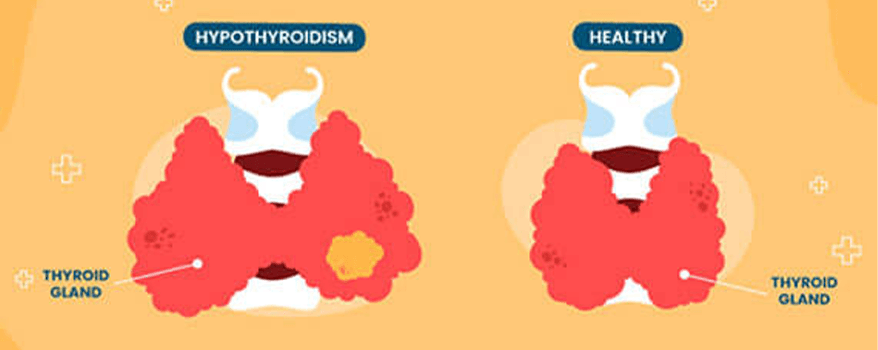
Hypothyroidism
What is Hypothyroidism?
Hypothyroidism occurs when the thyroid gland fails to produce adequate thyroid hormone, also known as an underactive thyroid. In its early stages, hypothyroidism may not manifest noticeable symptoms. However, if left untreated, it can give rise to various health complications, including elevated cholesterol levels and heart issues.
Diagnosis of hypothyroidism typically involves blood tests to assess thyroid hormone levels. Treatment normally consists of thyroid hormone replacement therapy, which is generally straightforward, safe, and effective once the appropriate dosage is determined in consultation with your healthcare provider.
What are the causes of hypothyroidism?
Hypothyroidism may stem from either a primary cause, directly affecting the thyroid gland's ability to produce sufficient thyroid hormones, or a secondary cause, leading to dysfunction of the pituitary gland's secretion of thyroid stimulating hormone (TSH).
Primary causes predominate, with the most prevalent being an autoimmune disorder known as Hashimoto's disease, also referred to as Hashimoto's thyroiditis or chronic lymphocytic thyroiditis. This hereditary condition involves the immune system mistakenly attacking and damaging the thyroid, impeding its hormone production.
Other primary causes of hypothyroidism encompass:
- Thyroiditis is marked by inflammation of the thyroid gland.
- Treatment for hyperthyroidism, such as radiation therapy or surgical removal of the thyroid.
- Insufficient iodine intake is a crucial mineral the thyroid utilises to synthesize hormones.
- Hereditary conditions are passed down through familial lines.
In certain instances, thyroiditis may develop following pregnancy (postpartum thyroiditis) or viral infections.
What are the risk factors of hypothyroidism?
Risk factors that may elevate the likelihood of developing hypothyroidism comprise:
1. Gender: Females are at a higher risk.
2. Age: Individuals aged 60 and above face increased susceptibility.
3. History of Radiation Therapy: Undergoing radiation therapy in the neck or chest region can heighten the risk.
4. Recent Pregnancy: Pregnancy, particularly in the recent past, can predispose individuals to hypothyroidism.
5. Family History: A familial background of thyroid disorders escalates the risk.
6. Presence of Autoimmune Conditions: Certain autoimmune conditions like Sjögren's disease and type 1 diabetes increase vulnerability to hypothyroidism.
What are the symptoms of Hypothyroidism?
The manifestations of hypothyroidism can vary widely among individuals and may be challenging to discern. Additionally, the severity of the condition influences the emergence and timing of signs and symptoms.
Initial symptoms may encompass weight gain and fatigue. Notably, these manifestations become more prevalent with age, irrespective of thyroid health. Consequently, one might only attribute these changes to thyroid dysfunction once further symptoms manifest. These may include skin alterations such as dry, scaly, or rough skin and brittle nails commonly associated with hypothyroidism.
Typically, the most frequent signs and symptoms of hypothyroidism encompass:
- Fatigue
- Weight gain
- Depression
- Constipation
- Sensitivity to cold
- Decreased sweating
- Slowed heart rate
- Elevated cholesterol levels
- Dry skin
- Thinning hair
- Impaired memory
- Muscle weakness
- Muscle stiffness, aches, and tenderness
- Joint pain and stiffness
Symptoms evolve gradually over several years for most individuals as thyroid function declines further, making them more discernible. However, it's important to note that many symptoms become more prevalent with age, regardless of thyroid status.
If hypothyroidism is suspected, consulting a healthcare provider is advisable. A blood test can confirm the diagnosis.
Hypothyroidism in adults
Additionally, research indicates that hypothyroidism symptoms in men may include erectile dysfunction, while women may experience fertility issues, irregular menstrual periods, or complications during pregnancy.
Hypothyroidism in young people
Although less common, hypothyroidism can affect young individuals, leading to delayed development in children or premature puberty in adolescents. Newborns may also exhibit congenital hypothyroidism, presenting symptoms such as excessive sleepiness, constipation, feeding difficulties, or impaired growth if left untreated.
Severe Hypothyroidism
Untreated hypothyroidism can lead to further complications, including a puffy face, hoarseness, anaemia, or hearing loss. In rare cases, severe hypothyroidism may progress to myxoedema coma, a critical condition necessitating emergency medical attention and characterized by symptoms such as profound fatigue, hypothermia, low blood pressure, and a decreased heart rate.
What are the complications of Hypothyroidism?
Hypothyroidism can lead to various complications, including:
- Cardiovascular issues
- Enlargement of the thyroid gland (goitre)
- Nerve damage and peripheral neuropathy
- Carpal tunnel syndrome
- Impaired kidney function
- Severe complications like myxoedema coma in advanced cases
- Obstructive sleep apnoea
- Mental health disorders such as anxiety and depression
- Joint pain and impaired balance
- Obesity, though research on the connection is ongoing, with moderate weight gain being more common
- Elevated cholesterol levels
- Fertility problems
- Pregnancy-related complications like preeclampsia and anaemia
- Increased risk of birth defects
When to see the doctor
Seek medical attention from your healthcare provider if you experience unexplained fatigue or exhibit other symptoms associated with hypothyroidism.
If you're undergoing treatment with thyroid hormone medication for hypothyroidism, adhere to your healthcare provider's guidance regarding the frequency of medical appointments. Initially, regular visits may be necessary to ensure optimal dosage adjustment. As treatment progresses, periodic check-ups will enable your healthcare provider to monitor your condition and medication effectively.
FAQS
Health In A Snap, Just One App.
KNOW MORE
